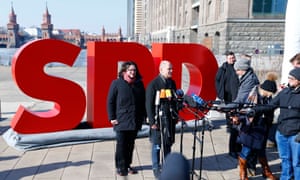Far-right AfD is winning working-class votes and SPD is becoming less relevant among young and middle-class voters.

Andrea Nahles (L) and Olaf Scholz of Social Democratic party (SPD) give a press statement in Berlin. Photograph: Hannibal Hanschke/Reuters
When Dietmar Nietan, treasurer of the German Social Democrats, takes the stage at the party’s Berlin headquarters at 9am today, the world will be watching closely – but the thoughts of his fellow functionaries will already be wandering to the challenges of the weeks ahead.
If Nietan announces that members of Germany’s centre-left party have voted against a coalition with Angela Merkel’s conservative Christian Democratic Union (CDU), the country will be plunged into political chaos and questions will arise over the future of a chancellor who can no longer organise political alliances.
If, as expected, Nietan reports a yes vote, it will end five months of political paralysis in Europe’s largest economy, but also pile pressure on the Social Democrats to reverse the party’s freefall in the polls and stop the erosion of one of the two central pillars of Germany’s postwar order.
Both of the SPD’s previous coalitions with Merkel as a senior partner have ended in the party recording historically poor results in national polls. This time around, senior members want to try a different, more aggressive formula. They hope to have found a suitably combative new figurehead in Andrea Nahles, a former leader of the Young Socialist youth wing. She has a leftwing slant, a reputation as a forceful orator, and once mocked Merkel by singing a version of the Pippi Longstocking theme song in the Bundestag.
Nahles, who is likely to take over leadership of Europe’s oldest social democratic party from Martin Schulz at a summit in April, faces the challenge of taking the fight to a conservative CDU that shares the government benches with her party colleagues.
A former labour minister, she is not expected to take up a role in the next cabinet, and would therefore have a freer rein to use her rhetorical skills in a parliament shaken by the arrival of the Alternative für Deutschland (AfD), the first overtly nationalist party in the Bundestag for half a century.
While the AfD will become the biggest opposition party in the event of a grand coalition, the presence of the rightwing populists has also encouraged liberal and leftwing parties to up their game. Clips of verbal sparring acts are now going viral in a way that used to be rare in the staid world of German politics.
The SPD is already priming its first weapon for the fightback: last Friday the party submitted a draft law to scrap paragraph 219a of the German penal code, which currently criminalises the “advertising” of abortion services. The proposal is likely to be opposed by a CDU with strong Catholic support, and could see just the sort of public clash that Nahles needs to raise her profile.
But if the success of the German centre-left’s new strategy is up in the air, it’s because the challenge is nothing short of existential. Weeks of coalition talks have seen the AfD overtake the SPD to claim second place behind Merkel’s Christian Democrats in some polls.
The former Social Democrat finance minister Peer Steinbrück said last Friday: “Like the Socialists in France, the SPD is in danger of caring more about anti-discrimination and lifestyle issues than the concerns of the majority of the population.” Among its working-class base, the SPD is haemorrhaging votes to the far right. In the town of Cottbus, near the Polish border, the Social Democrats were the strongest force as recently as 2014. But tensions between locals and refugees have harmed the SPD more than the CDU: in a poll last week the party lost 17 percentage points, and the AfD came top with 29%.
“Every recent grand coalition has weakened the SPD and strengthened the far right”, said the Cologne-based film-maker and SPD member Steve Hudson, who led a campaign for a no vote. “The next one could end in the death of the Social Democratic party in Germany.”
Support for the centre-left among young and middle-class voters also seems to be draining away, either to leftwing Die Linke, which topped a recent poll for the 2021 Berlin state elections, or to the Green party, which is remaking itself under a new liberal-centrist leadership.
“The SPD’s problem is that it is no longer the strongest party in socially relevant circles,” said political scientist and SPD expert Gero Neugebauer. “It has ceded ground to Die Linke and the AfD among the workers, and is losing votes to the Greens amongst the bourgeoisie.
“They say they need to deal with the threat of the new right, but their problem is less the AfD than a lack of answers on the issues the AfD is thriving on. The SPD, like the whole of German politics, is still struggling to identify what the challenges of globalisation really are.”
Source: https://www.theguardian.com/world/2018/mar/04/germany-social-democrats-grand-coalition-cdu-merkel
[Disclaimer]








